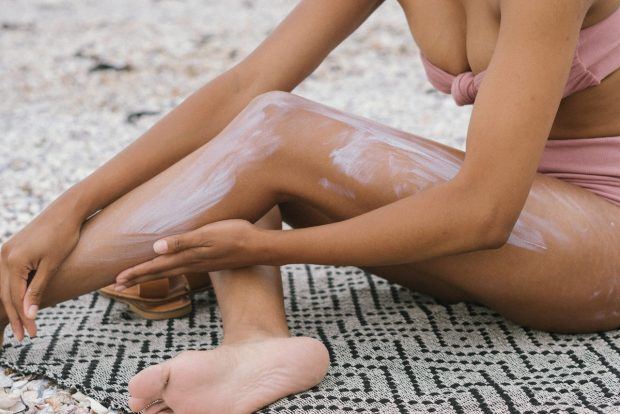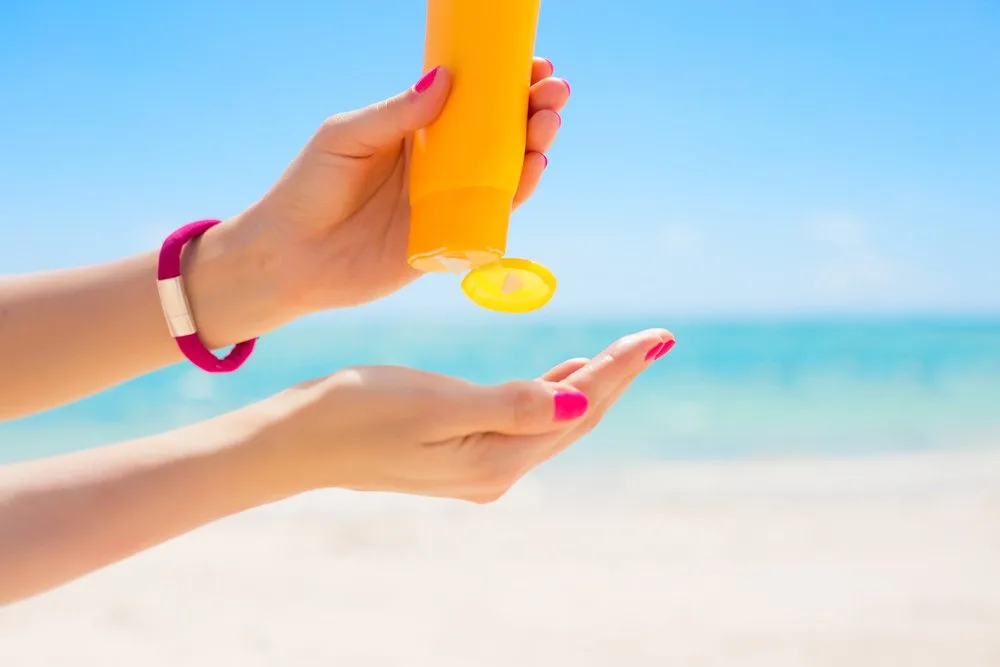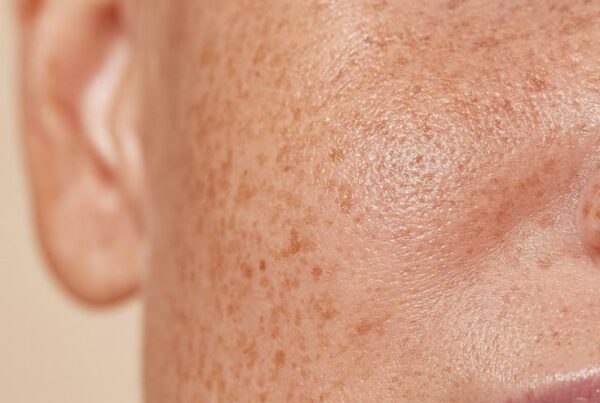Ever since the independent laboratory Valisure found dangerous benzene concentrations in 78 popular sunscreens in the spring of last year, many people have been confused about what products to use. Protection against ultraviolet radiation is essential. This is particularly true in the summer when the sun’s rays are powerful. However, it’s also vital during the other seasons, as you are permanently exposed to UV rays when you are outside.
Sunscreen protects you against sunburn, premature skin aging, and wrinkles, keeping skin cancer at bay. Skin cancer is the most prevalent cancer in America, with 9,500 people being diagnosed every day.
Chances are that you may be a regular sunscreen user. On the other hand, you may have just begun including it in your skincare routine, which is excellent. Regardless, you probably want to know which products have the highest quality and which ones to avoid. Furthermore, you may be fascinated by science and would like to know how sunscreen works.
While benzene ended up in those sunscreens by accident due to manufacturing contamination, plenty of companies intentionally adds harmful chemicals to these products, as they have desirable properties. These are primarily companies that make chemical sunscreen instead of mineral sunscreen. We will explore the science behind sunscreen and some of the best ingredients in these products.
How Chemical and Mineral Sunscreens Protect You Against Ultraviolet Radiation
Chemical sunscreen offers protection against UV rays by using various chemicals, such as oxybenzone, avobenzone, octinoxate, and octisalate, which are dangerous. They filter out ultraviolet radiation. These ingredients work like a sponge, absorbing ultraviolet radiation before reaching your skin.

Photo by cottonbro from Pexels
Once your skin absorbs sunlight, the chemicals in the sunscreen create a chemical reaction in which UV rays are converted to heat, and subsequently, the heat dissipates from the skin. When people talk about sunscreen, they usually refer to chemical sunscreens. Most sunscreen on the United States market is chemical sunscreen.
The following are the benefits of chemical sunscreen:
- it absorbs fast and dries with an invisible finish. This makes it ideal for people who opt for sunscreen they can wear daily.
- the lightweight, non-chalky finish also makes chemical sunscreen ideal for individuals with darker skin tones.
- it is a good option if you play sports or sweat a lot during the day.
- it is also perfect if you spend hours swimming or in the water.
In contrast to chemical sunscreen, mineral sunscreen physically blocks ultraviolet radiation by virtue of ingredients such as titanium dioxide or zinc oxide, which do not pose a health threat. The ingredients in mineral sunscreen are small particles sitting on the surface of your skin and preventing UV rays from penetrating it.
In addition to being a substantially safer alternative to chemical sunscreen, mineral sunscreen can also be applied on top of other skincare products. Because of the way it works, mineral sunscreen is also known as physical sunscreen or sunblock. Sadly, very few sunscreens on the American market are mineral sunscreens.
The following are the benefits of mineral sunscreen:
- it is very gentle, which makes it the perfect option for those with sensitive skin.
- the active ingredients in mineral sunscreen are more environmentally friendly.
- Mineral sunscreen is preferable for people looking to adopt a sustainable beauty routine
- it does not contain dangerous chemicals that will accumulate in your body over time.
What Are the Good Ingredients I Should Look for in Sunscreen?
Whether you prefer chemical or mineral sunscreen, you naturally want the product to be as nourishing for your skin as possible while offering you protection against ultraviolet radiation. Benzene is the ingredient – or rather a contaminant – you want to avoid in sunscreen.

Photo by Antonio Gabola on Unsplash
You can find the complete list of toxic sunscreens here. It is important to note that benzene was found in both chemical and mineral sunscreen. The health impact of prolonged benzene exposure is horrific. The inhalation and skin absorption of the chemical that occurs when using tainted sunscreen can result in leukemia, myeloma, lymphoma, or aplastic anemia. All of these diseases are debilitating and life-threatening.
Associate Professor of Dermatology at Yale University Dr. Christopher Bunick, MD and Ph.D., said that
“It is critical that regulatory agencies address benzene contamination in sunscreens and all topical medications at the manufacturing and final product level so that all individuals feel safe using sunscreen products” in the Valisure statement.
On a more joyous note, there are numerous sunscreens on the market or sold by small businesses online that are 100% safe for your health, environmentally friendly, and non-toxic. Some of the best ingredients in sunscreen that will help your skin maintain a youthful appearance are the following:
Shea butter
This ingredient is amazing for your skin, as it contains a high concentration of fatty acids and vitamins, and it also has anti-inflammatory and healing properties, which means that it can tone and soothe your skin.
Coconut oil
It helps your skin stay hydrated, contains a plethora of beneficial fatty acids, including palmitic acid, linoleic acid, caprylic acid, and lauric acid, and has antimicrobial properties that help protect your skin against harmful microorganisms, and reduces inflammation if you struggle with psoriasis, dermatitis, or eczema.
Macadamia oil
It contains squalene, which has the role of keeping your skin hydrated and healthy. It promotes the production of keratin, a substance that protects your skin and keeps it firm, and it is rich in antioxidants and Vitamin E, which helps your body remove free radicals, dangerous atoms seeking to attach to something in your body and harm it.
Aloe Barbadensis leaf juice
Commonly known as Aloe Vera, this ingredient works wonders on your skin if it is dry and needs moisturizing. It has anti-inflammatory properties, and the ingredient is suitable for all skin types, particularly damaged, broken, sensitive, and irritated skin.
Sunflower seed extract
A very popular ingredient in cosmetics, sunflower seed extract strengthens the skin barrier and keeps the skin smooth and soft, is rich in Vitamin E and fatty acids such as linoleic acid, which has antioxidant properties, and helps with premature aging and wrinkles, keeping your skin young and fresh.
People Should Continue to Wear Sunscreen Despite Alarming Findings
It has been decades since sunscreen was reviewed by the US Food and Drug Administration regarding safety and safety ingredients.

“Sunscreen’s last review as a safe treatment or requiring increased FDA regulation was in the 1970s. As more data comes out about chemical UV-blockers, a more definitive statement can be made,” says Dr. Richard Torbeck, a board-certified dermatologist with Advanced Dermatology PC.
This is a cause for concern, especially in light of Valisure’s findings on benzene in sunscreen. In fact, the chemical is not even seen as something that could end up in sunscreen by the FDA. Nevertheless, according to the agency, if benzene is not avoidable, it should be limited to 2 ppm (parts per million), which is still considered dangerous by many health organizations.
Keep using sunscreen
Yes, the news regarding benzene and other dangerous chemicals in sunscreen is unsettling. However, most medical specialists encourage people to keep using it, as the benefits outweigh the risks.
“Whether they choose a chemical sunscreen or a physical sunblock, if a patient wears an SPF of 30, I’m happy with it,” says Dr. Harvey, a Piedmont dermatologist and Mohs surgeon.
Yes, the FDA stated that only 2 out of the 16 active ingredients typically present in sunscreens – zinc oxide and titanium dioxide – are “generally recognized as safe and effective.” Nonetheless, the agency advocates for sunscreen, regardless of the alarming findings.
“Don’t let fears about chemicals prevent you from protecting your skin against the known dangers of sunlight. Exposure to the sun’s ultraviolet rays remains a major risk factor for skin cancer, which can be deadly,” says dermatologist Kanade Shinkai with the University of California, San Francisco.
Finally, consumers should be able to use safe, non-toxic sunscreen and avoid horrid medical complications such as skin cancers by sourcing ethical, benzene-free sunscreen brands for them and their families.
Who is the author?
 Having worked for the law firm for over 20 years, Jonathan Sharp is Chief Financial Officer at Environmental Litigation Group, PC. The law firm, headquartered in Birmingham, Alabama, specializes in toxic exposure.
Having worked for the law firm for over 20 years, Jonathan Sharp is Chief Financial Officer at Environmental Litigation Group, PC. The law firm, headquartered in Birmingham, Alabama, specializes in toxic exposure.
His primary responsibilities are client relations and the management of firm assets. He also works with the collection and distribution of funds, financial analysis, and case evaluation.
References:
- https://www.skincancer.org/skin-cancer-prevention/sun-protection/sunscreen/
- https://www.aad.org/media/stats-skin-cancer
- https://www.piedmont.org/living-better/the-difference-between-physical-and-chemical-sunscreen
- https://www.ncbi.nlm.nih.gov/pmc/articles/PMC3460660/
- https://www.valisure.com/wp-content/uploads/Valisure-Citizen-Petition-on-Benzene-in-Sunscreen-and-After-sun-Care-Products-v9.7.pdf
- https://www.cancer.gov/about-cancer/causes-prevention/risk/substances/benzene
- https://www.valisure.com/blog/valisure-news/valisure-detects-benzene-in-sunscreen/
- https://www.healthline.com/health/shea-butter-for-face
- https://www.healthline.com/nutrition/coconut-oil-and-skin
- https://www.medicalnewstoday.com/articles/324268#topical-skin-application
- https://www.dermatologytimes.com/view/skin-barrier-benefits-sunflower-seed-oil
- https://www.dermatologytimes.com/view/skin-barrier-benefits-sunflower-seed-oil
- https://www.healthline.com/health-news/how-sunscreen-chemicals-get-absorbed-into-your-skin
- https://www.consumerreports.org/sunscreens/fda-safety-risks-aveeno-neutrogena-sunscreens-with-benzene-a8377840278/
- https://www.piedmont.org/living-better/the-difference-between-physical-and-chemical-sunscreen
- https://www.npr.org/sections/health-shots/2019/08/04/747648291/confused-about-sunscreen-ingredients-heres-what-we-ve-learned?t=1647953630826
- https://www.elglaw.com/sunscreen/replacement/



![women [longevity live]](https://longevitylive.com/wp-content/uploads/2020/01/photo-of-women-walking-down-the-street-1116984-100x100.jpg)










